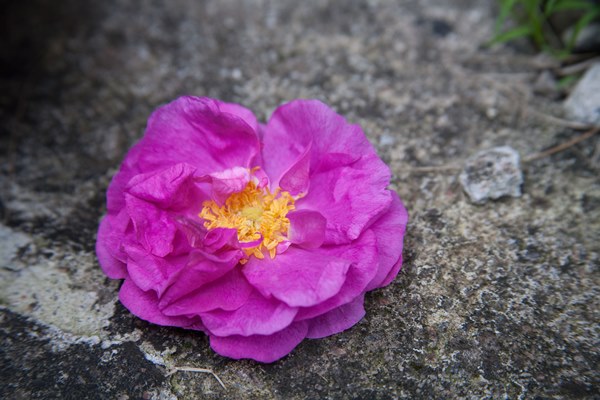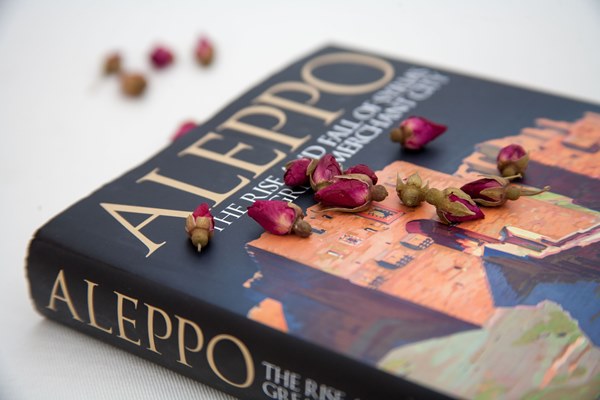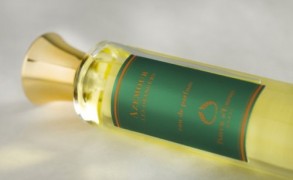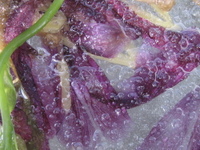Occasionally I come across articles mentioning “roses from Syria” as “a precious” ingredient in perfumes. One of the pieces even appeared in a newspaper that runs daily reports on the war in Syria. But real world events don’t enter into the fantasy bubble of beauty writing, with absurd and morbid results. We’re conditioned to think of perfume as something so rarefied and intangible that for all we know angels pick the flowers and blend essences in their celestial realms. The thought that a country, which has been at war for five years, might have difficulty growing roses doesn’t cloud the writers’ imaginations.

Until the war, which started in 2011, Syria produced 80 tonnes of roses, some of which were distilled on site and some exported to be processed in Europe. Syria wasn’t as large a producer as Turkey, Bulgaria or Morocco, but its roses had a delicious raspberry nuance. The last commercial sample I was able to get in 2011 still smells of sun warmed fruit and spicy honey. Damascus and the other rose growing provinces have suffered tremendously during the war, especially the area held by the revolutionary army and targeted in the heavy bombing campaigns by the Syrian regime. People have fled from the fighting, leaving plantation owners with few work hands and resources. As a one-time distiller told a reporter of The Express Tribune, “Today there are barely 250 grams (half a pound) of oil available to buy in the whole market.” What are the chances that it makes its way into a perfume produced by a luxury brand?
At first, seeing references to Syrian roses made me puzzled. A query among fragrance companies confirmed my suspicions that the writers were simply confused by the terminology. There is no rosa damascena from Damascus in your perfumes. It most likely comes from either Turkey or Bulgaria.
Rosa damascena (damask rose) is one of the two main types of roses used in perfumery, the other being the green and citrusy rose de mai, rosa centifolia. Its origins are probably in Central Asia, but when it was brought to Europe from Syria in the Middle Ages, it began to reference one of the greatest contemporary cities, Damascus. So, when press releases or perfume notes mention “rosa damascena” or “damask rose,” all they mean is a type of essence, rather than a place of origin.
The massive loss of lives and cultural heritage in Syria is a great tragedy and so is the loss of Syrian roses. There is a tendency to speak of Syria and other places in the Middle East as being in some other, dark and hostile universe, and reports of war tend to flatten and distort the image of the countries further. But East and West are false categories. The Syrian Ummayad dynasty was in Europe for over three centuries, and the contributions of Islamic scholars to algebra, medicine, mathematics, physics, agriculture, and arts are hard to overstate.
In perfumery, for instance, we are still using the same methods developed by the Persian polymath Avicenna (Ibn Sinna) to distill rose essence and some of the accords we favor in so-called oriental perfumery have origins in the courts of Cordoba. When Syrian poet Nizar Qabbani writes, “I have come to you . . . from the history of the Damascene rose that condenses the history of perfume,” he speaks the self-evident truth.

P.S.
One of the best history books I’ve read lately is Aleppo : The Rise and Fall of Syria’s Great Merchant City by Philip Mansel. It shows many layers of Aleppo that can’t be glimpsed through newspaper reports. Without romanticizing its past, Mansel presents a vivid portrait of a city and its inhabitants. One of the most cosmopolitan cities in the region, Aleppo has always been a true melting pot, with commerce and trade as the glue that brought people from different religions and communities together. This resulted in one of the most sophisticated cultures, not to mention splendid cuisine and architecture. “Paris, c’est joli, mais ce n’est pas Alep,” comments an Aleppo lady in response to a question about her vacation. “Paris is pretty, but it’s not Aleppo.” Since we are living through the complete obliteration of the city–the most recent Russian bombardments have laid waste to the oldest parts of Aleppo, Mansel’s book can make for heart-wrenching reading, but for this reason, it’s even more important to understand what exactly we are losing.
Photography by Bois de Jasmin, rosa damascena













86 Comments
Annie: I hope one day we will smell real Syrian roses again. Thank you for another book recommendation. I know very little about Aleppo or Syria and any other suggestions are appreciated. October 17, 2016 at 8:04am
Victoria: I liked Mansel’s other books, and I recently read “Levant.” I don’t think what there is specifically on Syria that interests you, history, culture, current events, but another book I read and liked was “My House in Damascus,” about a woman who buys a dilapidated house in Damascus and explores the country. She shows its descent into the current conflict and explains some of the reasons behind it.
And of course, I can’t recommend the writings of Adonis, one of the most prominent Syrian poets, highly enough. October 17, 2016 at 9:43am
mayfly: Thank you for this insightful article, Victoria, you’re knowledge coupled with sensitivity and passion are always such a joy to read.
What is happening in Syria is so awful on many different levels..and you’re so right that as a country it is ‘othered’ by the west, so a book like this really works on redressing the balance. I’m really looking forward to reading it, and will order it from the library post haste.
Ps I’ve been reading The Pillow Book, it’s such a treat! October 17, 2016 at 8:05am
Victoria: Yes, I think that it also shows how disconnected the discussion of perfume is from the real world events. And yet, perfumery is one of the most globalized industries and the contents of our perfume bottles are affected by all that’s happening. October 17, 2016 at 9:45am
Victoria: So happy to hear that you like The Pillow Book! October 17, 2016 at 9:45am
Sandra: So you are saying Damask Roses in perfumes are not from that origin but another country?
Are there any perfumes that have the oil that comes from there? I would like to buy something in support
Do you have other articles one could read on this topic? I would like to engage and read up
What is happening in Aleppo is awful, what are we to do? So sad
There is “cultural genocide” happening there, and other parts of the middle east. Tibet is another country that has lost its cultural ways..and probably language. October 17, 2016 at 8:09am
Victoria: I think that book on Aleppo is a good place to start. Also, Syria’s Uprising and the Fracturing of the Levant by Emile Hokayem gives a very good overview. I mentioned a couple of other books to Annie below. As for the articles, The New York Review of Books and The Economist regularly run in-depth reports.
Yes, rose damascena or damask rose is just a name for the one specific rose hybrid. October 17, 2016 at 9:50am
Sandra: Thank you!
If there is any perfumes are products to help support like a perfume or anything (damask rose not from other countries) let me know October 17, 2016 at 10:21am
Victoria: As I mentioned in my article, there are no perfumes–as far as my inquiries revealed–with the Syrian rose essence on the market. The best contribution we can make in current circumstance is to the reputable charities like Doctors Without Borders. The humanitarian situation in Aleppo is dire:
http://www.doctorswithoutborders.org/country-region/syria
The reason I support Doctors Without Borders is because it’s one of the few charities that are independent and funded by private individuals, rather than government agencies. I’m sure there are other good organizations, but this is the one I support. October 17, 2016 at 10:41am
Alicia: This the same reason why I also support Doctors without Borders, and have done so for years. I also support Red Cross. October 17, 2016 at 4:35pm
Victoria: Oh, by the way, you might like this article:
http://www.forbes.com/sites/elizabethmacbride/2015/11/29/wartime-entrepreneurs-50-syrian-women-find-a-way-to-export-aleppos-famous-soap-to-the-u-s/#7ef8c08743b0
and here is the Foundation that sponsored the initiative:
http://www.karamfoundation.org/scentsofsyria/
I don’t have any personal experience with this organization. Our Syrian store in Brussels sells a different brand of Aleppo soap, but the factory has since relocated to Lebanon. October 17, 2016 at 11:03am
Sandra: Thank you!
My husband and I do make donations to DWOB, we should do another giveaway on this blog. I will look through my closet and see if I have any perfume that could use a home. October 17, 2016 at 11:23am
Victoria: That’s very generous of you! Do let me know. I don’t have another prized vintage to give away, but I’m sure I can find an interesting prize, and I will post to ask other people if they want to participate. October 18, 2016 at 10:32am
OperaFan: Sandra, that’s such a great idea, and Thank you Victoria, for providing the links and shedding light from a perspective we can especially appreciate.
I, too, wish there was some way I could help with the situation in Syria. It is so sad and frustrating. October 17, 2016 at 1:51pm
Victoria: Individually, yes, we can do very little. But by helping and donating, it’s already something. I’m not sure what projects there are in the US, but here in Europe there are all sorts of volunteer efforts. Despite all of my gloomy thoughts, working with others always lifts my spirits and makes me feel as if I’m doing something concrete, even if it’s just a little thing that’s within my means. October 18, 2016 at 10:48am
Solanace: I thought about Seven Virtues Perfumery. It’s not exactly for Syria, but it shares this cosmopolitan spirit of Victoria that inspires us to look further into Middle Eastern countries than the usual stereotypes and take a glimpse of their beautiful and ancient culture. October 17, 2016 at 4:00pm
Victoria: I will have to take a look at it. Thank you! October 18, 2016 at 11:05am
Sandra: I finished the Mansel book over the weekend, very well done and pulled at my heart strings.. June 4, 2018 at 8:59am
Victoria: Thank you for letting me know! You’re such a voracious reader. June 5, 2018 at 6:00am
Sandra: Thank you.
I have to bring it back to the library and I am having a hard time letting this book go, it has touched me very deeply.
I also loved this line from the book: “Smoking is almost universally practiced by the Aleppine ladies, and the greatest compliment that they can pay you is to transfer the pipe from their own lips to yours.”
Brillant!! June 5, 2018 at 8:54am
Victoria: Indeed! June 6, 2018 at 9:42am
looloolooweez: The Syrian violence is so saddening, as is some folks’ xenophobic reactions… and I had no idea about the “damask” roses, what a terrible loss for both those farmers and the world! October 17, 2016 at 9:52am
Victoria: I can’t think of the refined Allepian cuisine without recalling the lush, honeyed perfume of Syrian roses. It’s such an extraordinarily rich culture and has been for centuries. October 17, 2016 at 9:57am
rickyrebarco: Thank you, Victoria. Your insights are so valuable. I love the fragrance of Damascene roses. A favorite scent is Keiko Mecheri’s Rose Damascena. So beautiful. October 17, 2016 at 10:02am
Jillie: Thank you, Victoria, for your explanation of the derivation of damask rose. I had no idea.
I don’t know if you would wish for the following to be included in your blog (people can find it on YouTube) – it is the heart-rending story of the last flower seller in Aleppo, screened by Channel 4 in the UK, and brought to my attention just how much has been destroyed in Syria: history, culture, lives. So tragic. All governments should be made to watch it.
https://www.youtube.com/watch?v=lJGp3g93h6M October 17, 2016 at 10:29am
Victoria: One thing I should have mentioned is that it was also named rosa damascena for similar reasons that the non-French perfume brands evoke Paris in their names and creations–a symbol of quality.
Thank you for posting this link. It’s all tragic beyond belief. October 17, 2016 at 10:51am
Nadia: Is the rose flower you provided an authentic R. damascena or R. galica iofficinalis? June 17, 2020 at 6:52am
Sandra: Thank you for this video.
Heart wrenching October 17, 2016 at 10:55am
mayfly: Jillie, , thank u for sharing this link, I have just watched it, and it is absolutely heartbreaking-how can our governments allow this to happen. U are right, I think everyone should watch this.
The courage and hope of the citizens of Aleppo, in the midst of destruction and death is awe inspiring, I feel humbled. October 18, 2016 at 5:45am
maja: No words for so much sadness in the video. October 18, 2016 at 2:56pm
Gabriela: Thank you for the video. Crying. October 19, 2016 at 7:37am
Annie O: Thank you again for adding such important depth to perfume awareness. Scents don’t stand alone, but as you said, are the result of wisdom and culture.
The book on Aleppo comes in on Friday! October 17, 2016 at 10:59am
Victoria: Very well said!
Mansel is a thorough researcher and a great story teller. This is the third book by him that I’ve read, and they have all been very good. October 17, 2016 at 11:05am
Trudy: Thank you Victoria. So much sadness in the world today, especially this region and its people. Their way of life destroyed and their future so uncertain. Thank you for helping to bring perspective with something so simple and beautiful as a rose and as heartbreaking as its loss. I will read Mansel’s book so I can have greater understanding of the situation. October 17, 2016 at 11:13am
Victoria: There is also another very good book, Heirs to Forgotten Kingdoms by Gerard Russell, which talks about all of the communities and ancient religions that survived in the Middle East until the 21st century (while in Europe, they were eradicated centuries ago). Of course, now, they are too under threat like never before, but the fact that they were around for so long and managed to preserve their cultures was because the region wasn’t always this dysfunctional and bloody. Mansel’s book does capture it too, and it provides such a good perspective. October 18, 2016 at 10:30am
kekasmais: Years ago, I went to Hiroshima on a day trip during a stay in Japan. On the one hand, it was hopeful; things can come back to life when given the peace and permission to do so. On the other hand, one is acutely aware that hardly any of the infrastructure around you predates August 6th, 1945. It’s like a scar that no one sees but everyone knows is there.
Loss is impossible to scope. It hurts to think of the masses of Syrians in exile not just for the pain they carry now, but what awaits should they ever be allowed to come home; there might truly be nothing left of their former lives, not houses nor keepsakes nor roses.
The book on Aleppo is on a holding list for me. Thank you another touching and thought-provoking article, Victoria. October 17, 2016 at 11:27am
Victoria: Thank you; somehow Hiroshima crossed my mind in this context, but I couldn’t articulate what I thought. You put it well–you sense that despite it all, the scars remain. October 18, 2016 at 10:36am
Connie: Thank you for the look into the world of roses and the sadness that surrounds this whole event. It is sad what is happening in this world today and we will be at a loss when we can no longer find some of the beautiful things that come out of this and other countries that are ravaged by evil and greed. Roses in any form are a splendor, in my opinion, and to read your article, it reminds me of a lost memory I sometimes evoke when I smell roses. Lost lives and lost loves and memories of the past. Charming article and very moving! October 17, 2016 at 11:36am
Victoria: Yes, and not just roses. It’s the loss of millions of lives and the culture, unique, complex, rich, that they created. Roses can be regrown, but that kind of void is hard to fill. October 18, 2016 at 10:40am
Connie: Yes, Victoria and it is all so very sad. Hard to keep one’s spirits up these days what with all the news and turmoil. October 18, 2016 at 2:14pm
Victoria: It is, I agree. Still, for every spell of despair, one must find a source of hope to counter it. October 19, 2016 at 7:37am
Annikky: Good to know you enjoyed the book – on the list it goes. October 17, 2016 at 12:27pm
Victoria: He’s a good writer. By the way, I noticed that Dalrymple gave it an enthusiastic blurb. October 18, 2016 at 10:41am
Ann: Bread and roses. It always comes back to both. Thank you for the book recommendation. I just ordered it. October 17, 2016 at 12:28pm
Victoria: It does, doesn’t it. October 18, 2016 at 10:41am
Karen A: Thank you. October 17, 2016 at 12:48pm
Victoria: And thank you for reading. October 18, 2016 at 10:41am
Amalia: I hope one day Syria will smell the air of freedom and peace! And we would smell Syrian roses again, as a symbol, that life beats the shadows of death. October 17, 2016 at 1:33pm
Victoria: Such beautiful words, Amalia. I watched the video Jillie posted, which was as heart-breaking as she said, but somehow it made me cry more, because of the strong spirit and resilience of the Syrian people. The gardener, Abu Ward, in the video says: “Flowers help the world, and there is no greater beauty than flowers. Those who see flowers enjoy the beauty of the world created by God. And when you smell them they nourish the heart and the soul. The essence of the world is a flower.” October 18, 2016 at 10:44am
Maria: Thanks a lot Victoria for bringing your sensitivity out of beauty sterotypes and misinformation. I really hope we could smell freedom and peace, and I hope those that work with this wonderful flower could come back. October 17, 2016 at 1:43pm
Victoria: Perfume writing in magazines and press releases is so disconnected from reality that sometimes it produces such absurd and morbid results.
I hope so too! If we don’t hope, what’s else there left to do? October 18, 2016 at 10:45am
Alicia: Victoria, many years ago, when I was a student at the Ecole du Louvre, I was stunned at the sight of one of the first witnesses of Sumerian art: the depiction of a conqueror standing over a mountain of severed heads. The cuneiform inscription read that the enemy city had been destroyed. Bombings do the same now, more efficiently. Except for scale, the result is always death. We are talking of lands bathed in blood for millennia, of cities built upon the ruins of many others, erased by the cruelty of mankind since nearly the start of recorded history. This year Isis destroyed the glorious remains of Palmyra. The rosa damascena is a species, but were the rose of Damascus is something else, were it a symbol of this history, it would be a plant whose roots were fed with blood and watered with tears. I wish I could think otherwise, but I have little hope. Mosul is being bombed as I write these words, the ancient site of Nineveh, whose ruins tell tragedies of old are seen nearby. The Bible says that once Jonah stopped its destruction. I see no prophet now to defeat the Angel of Death. October 17, 2016 at 2:53pm
Victoria: The Russians are bombing Aleppo for the very modern foreign policy objectives. The whole conflict is very modern and its roots don’t have anything to do with the Sumerians, more like the French colonial policies of the 1920s, the Cold War power play dynamics and the rise of nationalist movements. I wouldn’t overdetermine the history of Syria so much, lest inadvertently we end in the realm of stereotypes. Not only does “lands bathed in blood” describe pretty much any place on earth, save perhaps for Antarctica, but also the vibrant, sophisticated and diverse culture of Syria is the best testament to the fact that these lands managed to live in peace for long stretches of time. October 18, 2016 at 10:57am
Anne: Yes, this is it exactly. I teach a unit on crusades and have to open the entire thing basically with this paragraph because of that terrible tendency to pre determination and othering. I end on talking about how colonial discourse in fact does not use crusading rhetoric, as it is entirely orientalist- it is Daesh that does as part of its empire goals.
It is however, terribly depressing to be talking about the region when large parts of it no longer exist – and I make sure to use photographs from now as well. Just in case no one was getting it. October 19, 2016 at 6:06am
Victoria: I used to teach a course on the 20th century political movements, and it was a point I had to make too.
As one of my professors used to say (repeating his own professor), “It is bitter hard to write the history of remainders.” I think that it’s also bitter hard to talk about these vanished places. October 19, 2016 at 8:05am
Anne: Yet I should be used to it as I always talk about remainders of history (medievalist) by trade. What is truly bitter hard is to watch them disintegrate before your eyes and and become remainders, knowing there is horrific human toll. I was discussing this with a colleague who works on early history of first peoples and how to try balance the objectivity without getting crushed. And if you should. October 20, 2016 at 2:39am
Victoria: It’s a good question. I have always found when doing historical research, that striving for objectivity helped me keep my balance. But of course, sometimes the weight of history is just too much. And explaining events to your students takes it to another level. October 20, 2016 at 3:01am
Anne: It does, but sometimes in some fields being objective just feels like you are contributing to the problem, or have little outlet for the lack of answers and the continued suffering. Especially when students begin to feel that too in their analysis. Or have been refugees. October 20, 2016 at 3:36am
Victoria: In some disciplines like political science there is tendency to believe that theories can answer everything. When, in fact, it’s not science as such, and it can’t possibly begin to explain, much less predict the events. This delusion was manifested to me during the Iraq war when the political scientists formulated all of these neat theories of what will happen. And all of them were wrong. It’s not a coincidence that Huntington, whom I already brought up in less than positive light, is a political scientist. October 20, 2016 at 3:43am
Anne: This was why I never pursued political science beyond my major, which I was completing right when the Iraq war happened. So many non satisfactory theories that failed to account for so much that was often reasonably obvious. And still struggle. Don’t get me started on Huntington – talk about dangerously naive generalisations that fail to understand any form of reality. I still am horrified that his ideas hold any currency.
I ended up in History, because while I want to yell at half them, by and large it is about breaking answers down and making everything complex. It is well known if you want a sound byte on history then don’t ask a historian – good ones are incapable of it. October 20, 2016 at 6:45am
Victoria: Huntington was inspired by Bernard Lewis, of course, whose ideas influenced the American policy makers a great deal (and the outcome of the Iraq war illustrates the delusion of doing so.) Another case of dangerous generalizations and woeful biases. October 27, 2016 at 12:29pm
Alicia: Correction: instead of ” but were the rose of Damascus is something else”, It shouldd read “but the rose of Damascus is something else,” October 17, 2016 at 2:59pm
Liz: I have often mulled over the etymology of the rosa damascena, especially as I am pondering several oils and scents to use in some skincare I am making. I don’t think I ever read the name without thinking of Syria, in its current plight. The rose becomes even more poignant a reminder of so many incredible cities and their peoples who are now being wiped off the map. In Malta, we receive many irregular migrants from all parts of war torn southern and eastern Mediterranean shores. A friend of mine is a news photographer and his images of migrants over several years document the bewilderment, tragedy and loss. A Syrian doctor managed to get to safety here, but lost all his family en route. What the Damascena Rose will be a symbol of for future generations, is hard to say. Thank you Victoria for another post of such depth of sentiment. And for the suggested reading for those of us who sorely need to understand more of the region and its peoples if we are to help in our small way. October 17, 2016 at 3:00pm
Victoria: I spoke with a rose grower, who had an interesting theory that the hybrid we have today combines genes of the Eastern, Central Asian and European roses, and that its hybridization has been perfected over centuries. Which makes it a very interesting plant on all levels. Plus, it’s currently the most oil rich rose. The one in my photo is an old variety planted by my great-grandmother in the 40s. I took a flower to a botanical garden to figure out its strain, and the specialist confirmed that it was indeed damascena. The curious part is how long it retains its perfume. I have a batch of dried roses from 2-3 years ago, and my closet still smells of honey and spice!
I have a friend who works in Greece in the same capacity. His stories are so heart-breaking as are his images. October 18, 2016 at 11:02am
Karen A: The rose in your photo looks like a Gallica rose perhaps Rosa gallica officinalis – commonly known as Apothecary rose. Highly fragrant and shrubby appearance. Dried petals stay fragrant for a long time, and it was used for medicinal purposes hence the common name. October 19, 2016 at 6:52am
Victoria: The botanist thought that it was rosa damascena, but I’m not a rose expert enough to judge. Looks similar to the damascena shrubs I’ve seen at the rose plantations, although the ones grown for essence are trimmed to make harvesting easier, while ours does whatever it wants. 🙂 October 19, 2016 at 7:26am
Victoria: By the way, I actually have been to Malta twice. I mentioned in one of my reviews that the first perfume I desperately fell in love with was Krazy Krizia. It was during my trip to Malta that I discovered it. October 18, 2016 at 11:05am
Rita: What a wonderful article! Its a shame that the war has made simething as luxurious as the smell of roses seems devoid of a country like Syria! Unbelievable! October 17, 2016 at 5:36pm
Victoria: Roses will grow back, as long as there is peace and people to grow them. October 18, 2016 at 11:06am
Gayle: What a powerful communication. I started out reading this as an escape but due to world circumstances the things that we’ve enjoyed for years are threatened and in the case of the Syrian roses, have been destroyed. What we treasure and enjoy can be taken away in an instant by forces we have not been directly involved with. Treasure and be grateful for what you have been privileged to receive and experience. October 17, 2016 at 8:11pm
Victoria: Thank you. October 18, 2016 at 11:08am
Raquel: When I was a teenager I saw some pictures of Aleppo and Palmyra in a encyclopedia. I decided that one day I’d visit Syria…sad, really sad, poor people. October 18, 2016 at 10:05am
Victoria: Very sad. October 18, 2016 at 11:13am
OnWingsofSaffron: Thank you Victoria, for this post. I congratulate you on always treading that fine line between the quest for beauty on the one hand, and addressing the—sometimes harsh, sometimes just unknown—reality with clear, steady and unadorned words on the other hand. And with that I mean the many other posts in which you throw light on say Islamic art, Persian poetry, or the brutal Syrian war. Like that we are reminded that the delightful world of scents are rare and beautiful moments of bliss, happiness, and art. October 18, 2016 at 4:10pm
Victoria: Thank you. The truth is that perfume field is so influenced by the Arab and Persian inventions that I think Ibn Sinna wouldn’t find the perfume lab today an entirely foreign place.
I find the Persian and Arab poetry from their golden ages fascinating precisely because it shows how people of different faiths and ethnicities can coexist and together create something greater, richer, more beautiful. Today we have demagogues telling us that it’s impossible. And yet, I only have to consider my own large family, which includes a dozen of ethnicities and several different religions, to see that the diversity is a very good thing. October 19, 2016 at 7:51am
Aurora: It is a very thoughtful and interesting post, Victoria. My knowledge of Alep was confined for the longest time to the wonderful soap and I find the reports of fighting and bombing of civilian population distressing (the BBC has a very good correspondent Lise Doucette, a Canadian). I wish the UK accepted more refugees but having had such a large immigration from within Europe, there is not much goodwill in that quarter alas. October 19, 2016 at 5:58am
Victoria: The Aleppo soap recipe is one of the first commercial soaps created. It’s ideal for dry skin or if you have hard water. But it too sadly has suffered. I follow the news from my favorite maker in Aleppo through their website, and I’m very distressed that there have been no updates since the last Russian bombings. Can only hope that they are ok. October 19, 2016 at 7:55am
Michaela: Terribly sad…
Thank you for keeping our feet on the Earth. And for the reminder of hope. October 19, 2016 at 7:14am
Victoria: Thank you for reading, Michaela. October 19, 2016 at 8:05am
Fabrice: Very interesting post. Thanl you. Not sure if it is ok to add this link here but this article from Reuters published last year was a good read: http://www.reuters.com/article/us-turkey-roses-idUSKCN0PC14P20150702 October 19, 2016 at 5:33pm
Victoria: Yes, of course, Fabrice. Thank you! The article is depressing, however. I knew that the rose industry is disappearing in some parts of Turkey, but seeing the grower say that in 20 years there may be nothing of it is even more worrying. October 20, 2016 at 2:15am
Wara: Victoria, Jillie and all the wonderful community members of BJ…i have been away from the community for so long and today, when i felt i could not stay away another day……i find this most wondeful story……thank you from the bottom of my heart for sharing your humanity amongst ourselves…it was like therapy for the spirit! These last few months have been difficult with the attrocities of the election, flooding from Matthew, the fight against the DAPL, attending to my mother who was ill (but now is much better)thank you, thank you, thank you…a million drops of your favorite perfume to each of you!!! October 23, 2016 at 12:18am
Victoria: I hope that your mother is well on her way to recovery! Thank you for such kind words. October 27, 2016 at 12:19pm
Leonie: Thank you for this piece, I had wondered for quite some time about what the connection was precisely between damask roses and Syria.
I was lucky enough to live in Damascus a few years before the war, sharing a courtyard house in the old city and studying Arabic for the year. I was amazed by all the perfume shops in the Hamidiya souq, who would mix you a scent according to your preferences. I’d forgotten that I brought back some rose perfumes as gifts – I should see if my mum still has the one I gave her. Sadly I didn’t buy one for myself, as it was before I became interested in perfumes. October 25, 2016 at 3:20pm
Victoria: Thank you for sharing this memory. I wanted to go to Damascus to study Arabic, especially since the Syrian version of Arabic is so beautiful. Unfortunately, I kept putting it off until it was no longer possible to go. October 27, 2016 at 12:22pm
JulienFromDijon: Don’t feel bad to worry about roses when people are dying. You aim at the same purpose.
You made it quite clear : Syria is not meant to be a greyish zone of war. It’s meant to be a colourful place to live, with people and roses. (It’s my carebear moment :D)
We must be reminded that we aim at Syria being a nice place to live.
We got accustomed to fathom Syria as a dystopian universe. And whoever will end up as a winner (or less of a loser) is still a grayish thing.
A photograph and animal rights activist made a similar experience.
Horrible pictures of hurt animals would shock people, but they would close their minds and discard the message.
While beautiful and heart-warming pictures of animals would make people more open, and the side-note about species extinction would seep more deep and come to fruition.
Sure, the horrible pictures served a better journalist rendition of reality, but the beautiful ones gathered people for what we’re aiming : something good and beautiful. November 30, 2016 at 7:38pm